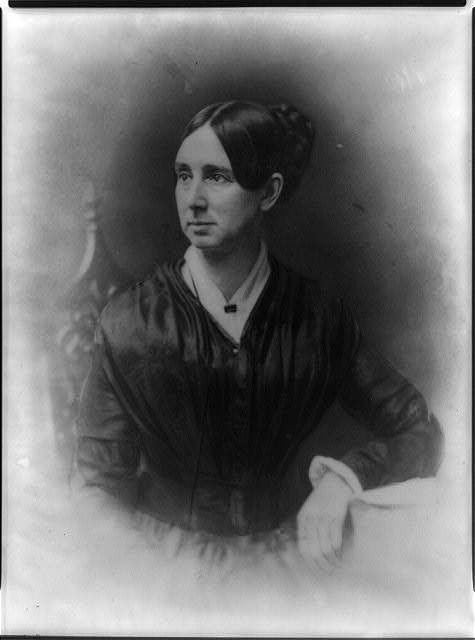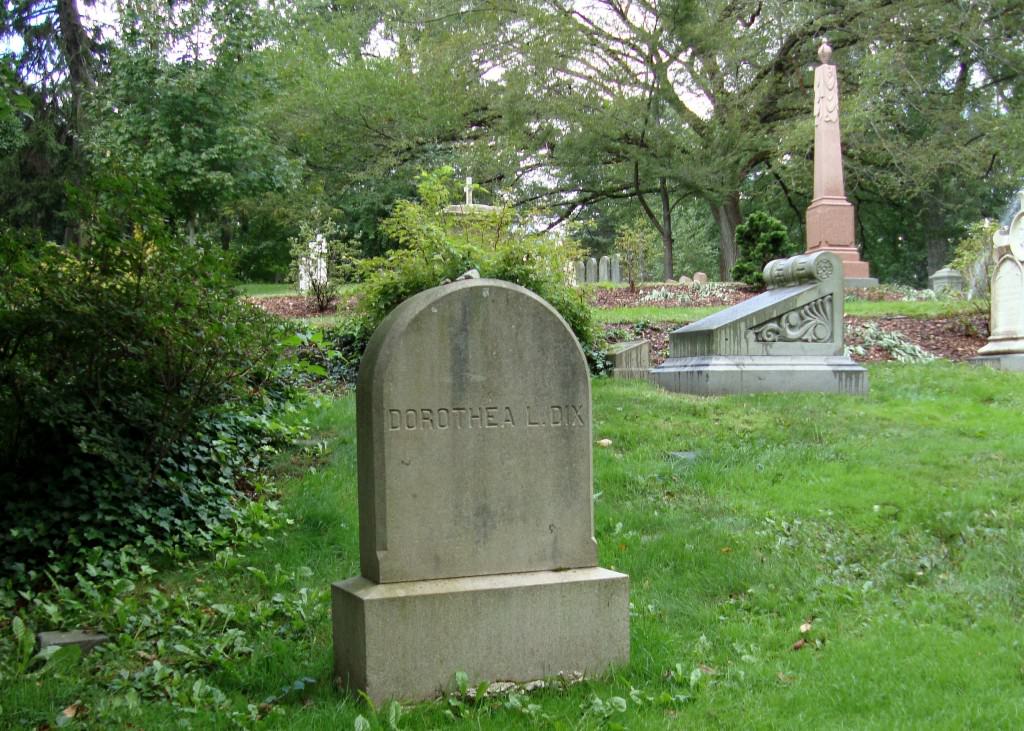Dorothea Dix (1802-1887)

A reformer and advocate for the mentally ill, Dorothea Dix was born in Hampden, Maine, on April 4, 1802.
Dix led a difficult childhood: her mother suffered from chronic pain, and her father was an abusive alcoholic. At age 12, Dix and her brothers moved to Boston to live with their paternal grandmother in the Dix Mansion. Upon her refusal to live the life of a wealthy ‘little lady,’ as insisted by her grandmother, she was moved to Worcester to live with her great-aunt. Dix opened her first school in Worcester around the age of 15, where she taught children between the ages of six and eight.
Dix moved back to Boston in 1819 and opened a school for girls in the Dix Mansion. She taught wealthy and poor girls, believing that both should have equal access to education. In 1824, as she battled tuberculosis, Dix worked as governess for the family of Unitarian minister William Ellery Channing (Lot 678, Greenbrier Path). She also dedicated her time to writing children’s books, including Conversations on Common Things (1824), Hymns for Children (1825), and American Moral Tales for Young Persons (1832).
In 1831, shortly after opening a new school in Boston, Dix collapsed. She moved to England to recuperate, and ended up learning about reform and treatment of the mentally ill. She returned to America in 1838 and accepted a position to teach Sunday School at the East Cambridge House of Correction. This became a pivotal moment in her life and career; after witnessing the terrible living conditions of inmates and the mentally ill, she devoted herself to a life of advocacy and reform.
Dix began surveying prisons, almshouses, and asylums around Massachusetts, supported by Samuel Gridley Howe (Lot 4987 Spruce Avenue), educator Horace Mann, and senator Charles Sumner (Lot 2447, Arethusa Path). She delivered her findings in a notorious sermon to the Massachusetts legislature, which immediately resulted in the enlargement of the Worcester Asylum. Dix continued campaigning for improved conditions for the mentally ill, influencing legislation in 15 states and Canada, and establishing 32 state hospitals, which ultimately created over 120 new institutions.
Dix emphasized improvement for the mentally ill through clean, spacious atmospheres, daily routines, meaningful employment, intellectual stimulation, religious instruction, and personal identity. This same system was later applied to inmates, as she pushed for penal reform in 1845 with the support of Charles Sumner. She spent the following years abroad, where she continued to survey and reform throughout Europe.
After returning to America in 1861, Dix was appointed superintendent of nurses for the Union Army. In 1881 she returned to one of the first hospitals she founded, in Trenton, New Jersey, after falling ill. She died in July of 1887 after spending nearly six years in her hospital. Her estate arranged for her burial at Mount Auburn close to the lot of William Ellery Channing on Greenbrier Path.
A $5,000 grant from Mass Humanities will help support the creation of two additional films in artist-in-residence Roberto Mighty’s ongoing earth.sky series that are focused on Dorothea Dix, the pioneering Civil War era nurse and early advocate for sufferers of mental illness, and George Thorndike Angell, a nineteenth-century Bostonian lawyer and animal rights activist. Dix and Angell both saw social problems that needed to be addressed and worked tirelessly to improve conditions for others. Their causes are still relevant to Massachusetts today and help to illustrate the huge difference that one individual can make to civic life as a whole.

Dorothea Dix is buried at Mount Auburn in Lot 4731 on Spruce Avenue.
Adapted from the research of Judy Jackson and Laura M. Gosman, as published in Mount Auburn Cemetery’s Person of the Week: Dorothea Lynde Dix, 2002.
Leave a Reply